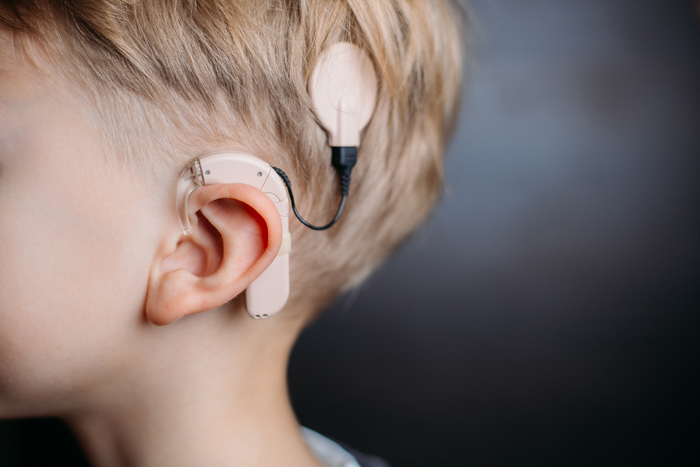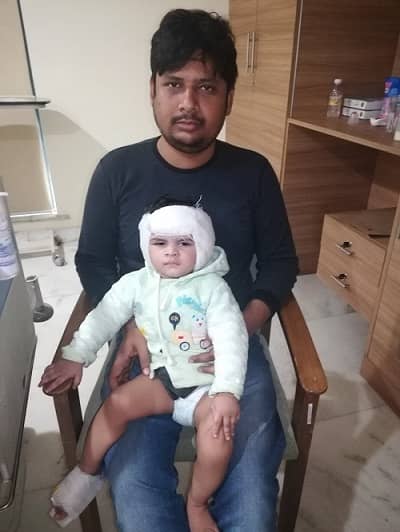Cochlear Implant Surgery in Karol Bagh, Delhi
People suffering from severe hearing loss benefit greatly from a cochlear implant. It is a device that is surgically implanted in the spiral-shaped bone in the inner ear known as the cochlea. But, the device does not suit everyone, so to avoid potential complications, it is better to discuss it with your doctor before you decide anything.
To know more, contact an ENT doctor near you or visit an ENT hospital in New Delhi.

What is a cochlear implant?
A cochlear implant is basically a small electronic medical device that enhances moderate to severe hearing loss. It benefits adults, children and babies with hearing loss. The device electrically stimulates the cochlear nerve.
Moreover, it comes with external and internal components. The external component gets placed behind the ear and comprises a microphone that receives sound waves. After that, the sounds are analyzed and turned into digital signals by a speech processor.
Subsequently, the transmitter receives the signals and forwards them to the internal receiver. A magnet holds together the transmitter and the receiver. On the other hand, the internal portion is implanted behind the ear, beneath the skin.
The digital signals are turned into electrical impulses by the receiver. The electrodes in the cochlea receive these impulses and stimulate the cochlear nerve. Finally, the brain receives it through the nerves and the person gets a sense of hearing.
Please note that the sounds that your brain notices are not the same as normal hearing. That is why speech therapy and rehabilitation are important for learning the proper interpretation of these sounds.
Who is suitable for a cochlear implant?
As we stated above, not everyone is suitable for a cochlear implant. Babies, children and adults can opt for this, if they suffer from severe loss in both ears and do not benefit from hearing aids. Moreover, they must not have any medical conditions that may augment surgery risks. For adults, they can be ideal candidates, if they:
- Suffer from hearing loss that disrupts verbal communication
- Even with hearing aids they have to lip read
- Lost all or most of their hearing afterward in life
- Agree to rehabilitation
When do you need to see a doctor?
If you have any of the above conditions and are considering a cochlear implant, you can talk to your doctor to know the pros and cons. Most importantly, you need to understand what cochlear implants can and can’t do.
Request an appointment at Apollo Spectra Hospitals, Karol Bagh, New Delhi.
Call 1860 500 2244 to book an appointment.
What are the benefits?
The benefits of cochlear implants mostly depend on the procedure and rehabilitation process. It may allow you to:
- Hear different sounds including footsteps
- Comprehend speech without having to lip read
- Hear voices on the phone and music
- Watch television without captions
- Help babies and toddlers to learn how to talk
How is a cochlear implant done?
After your doctor decides that a cochlear implant is the right choice for you, he/she will go ahead with the surgery. These are the basic steps:
- General anesthesia will be given before surgery.
- After that, your surgeon will make an incision behind your ear and make a minor indentation in the mastoid bone.
- A tiny hole will be created in the cochlea to insert the electrodes through it.
- A receiver will be inserted behind the ear, beneath the skin, and secured to the skull. Then, your surgeon will stitch the incision.
- After completion of the surgery, you will be moved to the recovery unit for close monitoring.
- Usually, a patient gets discharged a few hours after the surgery or sometimes, the next day.
- You will be shown how to care for your incision and follow-up appointments will be scheduled to check the healing process.
- One month after the surgery, the doctor will add the external parts and activation of the internal components will be done.
- Finally, in addition to regular visits to the doctor for a couple of months, you will need audiological rehabilitation to enhance your hearing and speech skills.
Conclusion
Thus, if hearing aids fail to improve your hearing or speech, cochlear implants may help you. An audiologist uses hearing exams and imaging tests for determining whether a cochlear implant is the right choice for you. Most importantly, audiological rehabilitation is important after surgery.
Any surgery that requires the use of general anesthesia is risky inherently. But, cochlear implant surgery has minimal risks and requires only a one-day stay at a hospital.
While cochlear implants enable a person with hearing impairment to receive and process sounds and speech, they do not restore normal hearing.
Usually, only a very small area of hair that is directly behind the ear is shaved off. Around 1 cm to 2 cm.
Symptoms
Our Doctors
DR. AMEET KISHORE
MBBS, FRCS - ENT(Gla...
| Experience | : | 25 Yeras Experience |
|---|---|---|
| Speciality | : | ENT, Head and Neck S... | Location | : | Chirag Enclave |
| Timings | : | Thur : 9:00 AM to 10... |
DR. ASHWANI KUMAR
DNB, MBBS...
| Experience | : | 9 Yeras Experience |
|---|---|---|
| Speciality | : | ENT, Head and Neck S... | Location | : | Chirag Enclave |
| Timings | : | Thur : 9:00 AM to 10... |
DR. MANISH GUPTA
MBBS, MS (ENT)...
| Experience | : | 23 Yeras Experience |
|---|---|---|
| Speciality | : | ENT, Head and Neck S... | Location | : | Chirag Enclave |
| Timings | : | Mon, Wed: 12:00 PM t... |
DR. R K TRIVEDI
MBBS, DLO, MS (ENT)...
| Experience | : | 44 Yeras Experience |
|---|---|---|
| Speciality | : | ENT, Head and Neck S... | Location | : | Karol Bagh |
| Timings | : | Wed, Fri : 12:00 PM ... |
DR. RAJEEV NANGIA
MBBS, MS (ENT)...
| Experience | : | 29 Yeras Experience |
|---|---|---|
| Speciality | : | ENT, Head and Neck S... | Location | : | Karol Bagh |
| Timings | : | Tue, Sat : 12:00 PM ... |
DR. SANJIV DANG
MBBS, MS (ENT)...
| Experience | : | 34 Yeras Experience |
|---|---|---|
| Speciality | : | ENT, Head and Neck S... | Location | : | Karol Bagh |
| Timings | : | Mon - Sat : 9:00 AM ... |
DR. S C KAKKAR
MBBS, MS (ENT), DLO,...
| Experience | : | 34 Yeras Experience |
|---|---|---|
| Speciality | : | ENT, Head and Neck S... | Location | : | Karol Bagh |
| Timings | : | Available by prior a... |
DR. NISHI GUPTA
MBBS, MS - ENT, DNB ...
| Experience | : | 26 Yeras Experience |
|---|---|---|
| Speciality | : | ENT, Head and Neck S... | Location | : | Karol Bagh |
| Timings | : | Mon, Tues, Thurs, Fr... |
DR. SORABH GARG
MBBS, DNB (Anaesthes...
| Experience | : | 16 Yeras Experience |
|---|---|---|
| Speciality | : | Pain Management... | Location | : | Karol Bagh |
| Timings | : | Mon - Sat : 9:00 AM ... |
DR. CHANCHAL PAL
MBBS, MS (ENT)...
| Experience | : | 40 Yeras Experience |
|---|---|---|
| Speciality | : | ENT, Head and Neck S... | Location | : | Chirag Enclave |
| Timings | : | Thur, Fri : 11:00 AM... |
DR. LALIT MOHAN PARASHAR
MS (ENT)...
| Experience | : | 30 Yeras Experience |
|---|---|---|
| Speciality | : | ENT, Head and Neck S... | Location | : | Chirag Enclave |
| Timings | : | Mon, Wed, Fri - 9:00... |
DR. SANJAY GUDWANI
MBBS, MS (ENT)...
| Experience | : | 31 Yeras Experience |
|---|---|---|
| Speciality | : | ENT, Head and Neck S... | Location | : | Chirag Enclave |
| Timings | : | Tue, Fri : 5:00 PM t... |
DR. SWARAJ MISHRA
MBBS - JLN Medical C...
| Experience | : | 28 Yeras Experience |
|---|---|---|
| Speciality | : | ENT, Head and Neck S... | Location | : | Chirag Enclave |
| Timings | : | Mon, Wed, Thur & Sat... |
DR. NAYEEM AHMAD SIDDIQUI
MBBS, DLO-MS, DNB...
| Experience | : | 14 Yeras Experience |
|---|---|---|
| Speciality | : | ENT, Head and Neck S... | Location | : | Chirag Enclave |
| Timings | : | Mon - Sat : 11:00 AM... |
DR. SALONI SINHA
MBBS, MS Surgery...
| Experience | : | 7 Yeras Experience |
|---|---|---|
| Speciality | : | ENT, Head and Neck S... | Location | : | Karol Bagh |
| Timings | : | Thur : 12:00 PM to 2... |
DR. PALLAVI GARG
MBBS, MD (General Me...
| Experience | : | 17 Yeras Experience |
|---|---|---|
| Speciality | : | General Surgery & Ga... | Location | : | Karol Bagh |
| Timings | : | Mon - Fri : On Call... |
DR. VENKATA RAMESH
MBBS, MS (ENT), DNB...
| Experience | : | 34 Yeras Experience |
|---|---|---|
| Speciality | : | ENT... | Location | : | Chirag Enclave |
| Timings | : | Mon, Wed, Thur, Fri ... |
DR. NITYA SUBRAMANIAN
MBBS, DLO, DNB (ENT)...
| Experience | : | 17 Yeras Experience |
|---|---|---|
| Speciality | : | ENT, Head and Neck S... | Location | : | Karol Bagh |
| Timings | : | Mon & Thur : 11:00 A... |
Our Patient Speaks
Yesterday my son had to undergo a surgery at the Apollo Spectra Kailash colony. His specialty doctor was Dr. Ameet Kishore, who is one of the excellent doctors I have ever come across. The experience that we had at Apollo Spectra was absolutely great. The rooms, corridors, and the washrooms were maintained well and were very clean. The complete staff of Apollo takes good care of you. They were all very gentle and always ready to help. They were so friendly that it gives you confidence during times like these. I would recommend only Apollo Spectra and Dr. Kishore for treatment to all my family and friends.
Aaban Ahmad Khan
ENT
Cochlear implant
We loved all the hospitality as well as the treatment that we were given at the Apollo Spectra Hospital. Right from all the tests that were performed on my daughter, which were done with unprecedented care and precision wherein even retesting was performed to ascertain that proper treatment was being administered to my daughter, to the hospitable and warm environment provided by the hospital - everything was just perfect. Proper orientation was given to us by the doctors, along with total regard for my daughter’s safety and treatment. Any time that my daughter felt sick, we observed that proper organisation and handling of the situation was done by the staff. I would definitely recommend the Apollo Spectra Hospital to everyone and pray that the Almighty blesses the kind doctor Ameet Kishore for all his good deeds while curing the patients.
Esther Hope Wambui
ENT
Cochlear implant
Right from entering the hospital to the point of discharge after my daughter's cochlear implant, we were treated respectfully. We were attended to by Mr. Nishant who was co-operative and walked us through the admission process smoothly and easily. The reception is a neat and comfortable place and the behaviour of the staff is also cordial. Dr. Amit Kishore was also very involved and co-operative. He visited Mili several times pre and post operation. We felt at home within the hospital premises. I would also like to highlight that the locality of the hospital is quite nice, with the metro station right above. The security guard at the gate too helped us immediately by ensuring we had a comfortable parking space. I wish the hospital, the doctors and staff all the best for their future.
Ms. Mili Jain
ENT
Cochlear implant
Our Top Specialities
NOTICE BOARD
CONTACT US
CONTACT US
 Book Appointment
Book Appointment






















.webp)
.svg)
.svg)
.svg)
.svg)








